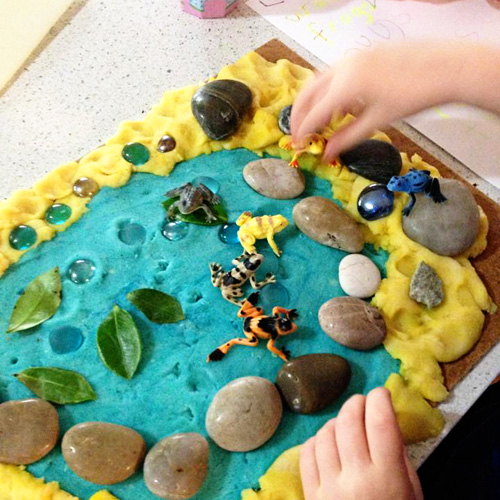9 Ways to Motivate Kids…to Play, to Learn & to Love Life
I have been asked twice recently what or whom inspires me as both a person and a parent. It might sound silly but my two young children really are my inspiration. I love their joy, their laughter, their curiosity, and their enthusiasm; they truly embrace life with both arms outstretched, intrinsically motivated to explore, and discover, and learn. I wish I could bottle it all as an elixir to be administered some time in the (hopefully distant) future as they grow and mature, as hormones ravage and we face the sort of life challenges that will likely threaten their overall sense of enthusiasm and motivation (and maybe just a little nip right now for their sleep deprived, time poor parents would be handy as well).
While a motivation potion would be very handy, I do believe there are ways we can protect our children from those societal pressures and distractions that have the potential to prematurely extinguish the unbridled enthusiasm of early childhood. Here are nine ideas for keeping kids motivated and loving life for longer;
1. Provide large blocks of uninterrupted time to play (and encourage periods of independent play). Play provides children with choice, space, spontaneity, creativity, emotional release, stress relief, connection, and not least, joy. I am always closely monitoring and considering our commitment to extra curricular activities outside of school, especially organised activities, in an effort to provide Immy with more free time for play.
2. Limit screen time. There seem to be two important considerations for supporting screen time limits – the impact of screen time on a child’s development (I recommend this interesting post for a balanced consideration of the research on video games) and the fact that to a large degree the time spent viewing or gaming could be spent more constructively elsewhere. While she is watching television (or using other screen-based technology), Immy’s capacity to freely play and create is quite obviously impacted. We keep the television off when it is not being watched and keep viewing sessions short, limiting the overall amount of screen time available to Immy and counting all forms of screen/technology consumption when tallying her viewing allowance, as this is what works best for our child and family.
3. Be conscious of the power of talk. As a parent, your words are a powerful influence, even when you don’t think small ears are listening. Be mindful of where your children are when you are talking to others about them or events impacting them. Practice being specific with praise – try saying what you see, “Wow, that was a strong kick, look how far the ball went!” and avoid overuse of generalised praise such as, “Good job!”
4. Appreciate effort. Make it a habit to encourage your children’s efforts over outcomes. When encouraging a child you demonstrate to them that you have faith in their developing abilities. Be accepting of mistakes, talking them through with your child as a means of helping them to learn from them.
5. Take interest in your child’s interests. Although you might not find garbage trucks quite as engrossing as your obsessed three year old does, it is clear when observing a child talking or playing around a specific area of interest how enjoyable and motivating their passion is. Make the most of their interest by harnessing the power of their obsession as a springboard to learning across other areas – you can read about, move like, count, measure, research, talk about, imaginatively imitate, draw, paint or model elements of almost any topic of interest a child might currently be fascinated by.
6. Provide your child with the opportunity to talk about worries or stressors. As it does for adults, stress has the power to distract and demotivate children and unfortunately children are often not nearly as good at ignoring these distractions. Be sensitive to your child’s mood and available for them to come to you to talk about whatever they are feeling, especially when worried or upset. Prioritise time spent together as a family having fun as a means of keeping the communication channels open.
7. Provide children with opportunities to accept responsibility and to make decisions. Providing children with age appropriate levels of responsibility and opportunity for decision making is important to the development of independence and has direct correlations to feelings of positive self worth.
8. Maintain good physical health. Encourage your children to be physically active, to eat an overall balanced diet and to take sufficient opportunity to rest and sleep – all important life long lessons for maintaining physical health.
9. Nurture curiosity and provide space for dreaming. In an effort to nurture the curiosity of early life we readily provide time and space for exploration to babies, toddlers and preschoolers. Older children also need ongoing opportunity, space and time to freely explore, discover and experiment, to pursue their own childhood passions and dreams. As a parent you can be a powerful role model for your children by allowing them to see you making time and space to pursue your own passions and interests.
Do your children inspire you as a person or as a parent?
Related Posts
- Let Go and Let Them Learn
- Friendship: Children Developing Empathy
- 10 Ways to Motivate Your Child to Love Learning
- Energy Boosting Tips for Busy Mamas


Great post! What a fabulous summary of some really important points for us to always try to keep at the forefront of our parenting – and encouraging healthy play development!
Good ideas. Its also a good idea to keep an eye on who their friends are. There are definitely kids that grow up too fast and can drag your own kids with them.
I love your thoughts on this, Christie. The power of talk and the opportunity for responsibility particularly hit the spot for me. x